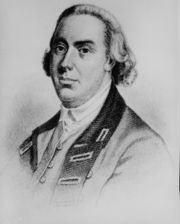“Boston Aug. 27, 1774.
Gentlemen,- Your letter, with the 291 sheep, were received safely, and met with a very hearty welcome.—
We have good reason to think that our oppressors see their mistake, and that they will ere long be convinced that Americans are not to be fritted or wheedled out of their rights.- The arm of a Tyrant is never supported by Justice, and therefore must fall.- Mr. Gage is executing the late Acts of Parliament, in their several branches, to the best of his ability. He is furnished with a council who will be careful (as their existence depends on the will of his master) to study his inclination, and to act every thing in conformity to his pleasure. We don’t expect Justice from them, and have no hopes that they will be guided by the laws of equity or the dictates of conscience. Certainly, men who will serve such an Administration as the present and suffer themselves to be promoted at the expense of the charter of their country, must be destitute of every idea’ of right, and ready instruments to introduce abject Slavery.- Mr. Gage may issue his precepts, and his council–may sanctify them; his juries may give verdicts, and an unconstitutional and venal bench may pass judgments: but what will this avail, unless the people will acquiesce in them? If the people think them unconstitutional, of what importance are their determinations? Salus populi suprema lex esto is a precious old maxim. The ministry have forgot it; but the people are determined to remember it.
We consider a suspension of trade through the continent with Great Britain, Ireland, and the West Indies, as the grand machine that will deliver us. If this should fail, we must then have recourse to the last resort.. As yet, we have been preserved from action with the soldiery and we shall endeavor to avoid it, until we see that it is necessary, and settled plan is fixed on for that purpose. The late Acts of Parliament are such gross infringements on us, that our consciences forbid us to submit to them. We think it is better to put up with some inconvenience, and pursue with patience the plan of commercial opposition, as it will be more for the honor and interest of the continent, as well as more consistent with the principles of humanity and religion.-
Mr. Gage finds himself very unequal to the task that is set him, and is at a loss for measures. He sees, and is astonished at, the spirit of the people. He forbids their town-Meetings, and they meet in Counties. If he prevents County Meetings, we must call provincial Meetings; and, if he forbid these, we trust that our worthy brethren on the continent, and especially of the town of Norwich, in Connecticut, will lend us their helping arms in time of danger, and will be no less conspicuous for their fortitude than they now are for their Generosity.
We have nothing important to inform you of besides what you see in the public papers. Should any thing worthy your notice take place, we shall gladly communicate it to you. We are, gentlemen, your gratefull friends & Hbl Servts,
Joseph Warren,
Per order the Committee of Donations
To the Gentlemen the Committee of the Town of Norwich.”
Source: Contemporary ms transcript in Boston Committee of Donations Letterbook 1774-1775, Boston: Massachusetts Historical Society Ms. N-2038 Tall, pp. 13-14. This letter appears in its entirety in Richard Frothingham, Life and Times of Joseph Warren. Boston: Little, Brown, & Co. 1865, pages 350-351. It also appears in Massachusetts Historical Society Collections, 4th series, iv. Page 46.
Commentary: The Boston Committee of Donations gratefully and eloquently acknowledged money and goods donated for the relief of Bostonians, whose commerce was stifled by the Boston Port Bill. The committee’s actions amplified communications from the Committee of Correspondence, determined where and how the donations would be distributed, and, by the following winter, transitioned to an arm of the Massachusetts Provincial Congress, and eventually a quartermaster supply organization for provincial armed forces at the beginning of the Siege of Boston.

 Follow
Follow